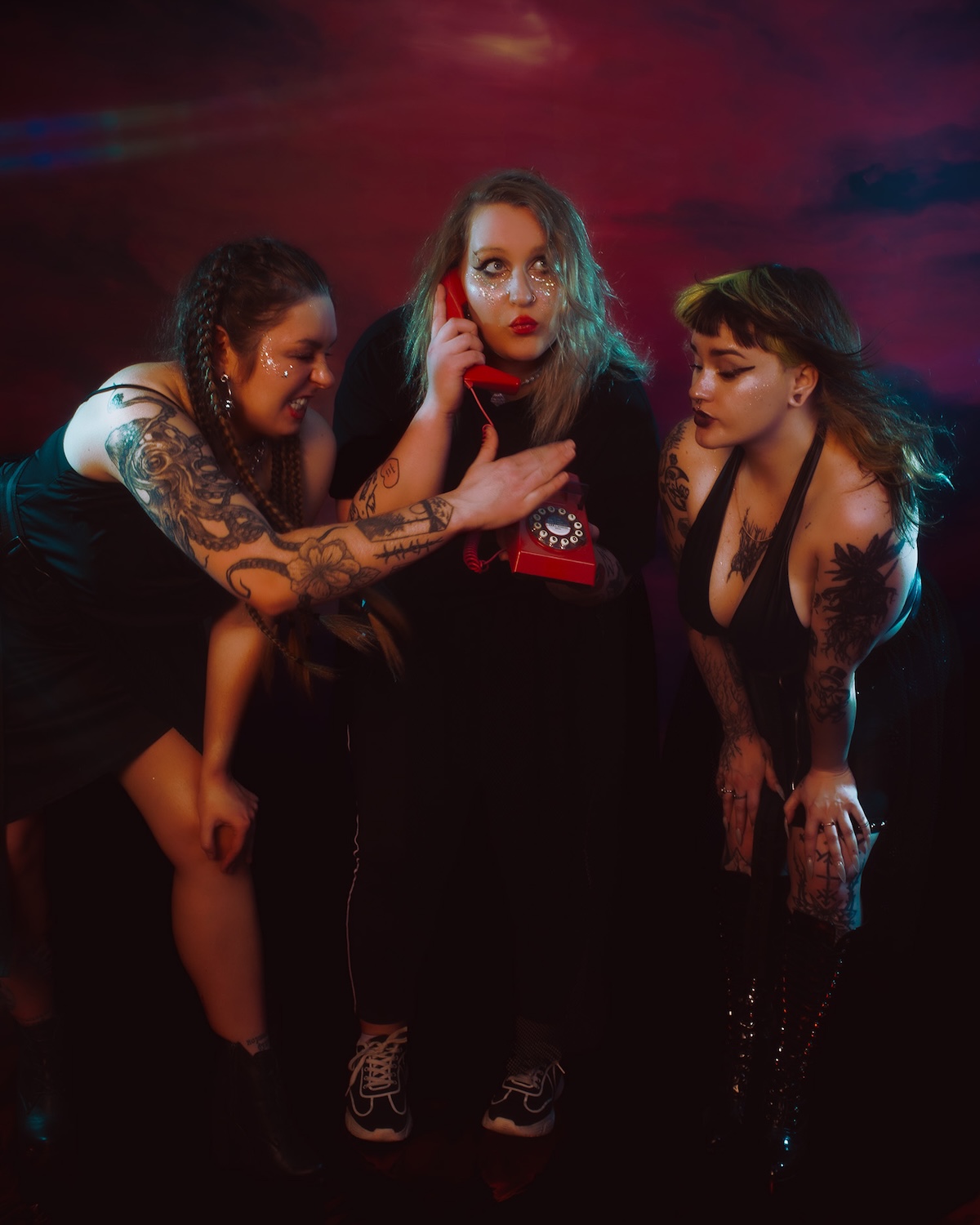Even War Can’t Stop Ukrainian Power Trio Death Pill


Being in a band takes work. It’s hard enough to manage conflicting schedules when all band members reside in the same city, but the three women who make up the heavy Ukrainian outfit Death Pill don’t even live on the same continent.
“We’re a very well-organized band,” says drummer Anastasiia Khomenko, only half-joking. Khomenko joined her bandmates—bassist Natalya Syeryakova and guitarist/lead vocalist Mariana Navrotska—in a remote interview that spanned several time zones and three hemispheres. Despite the geographic and temporal spread, the women’s chemistry was evident—the three talked shop, reminisced, and told stories easily, with zero awkwardness. Clearly, they’re used to working this way.
More from Spin:
- On ‘Once Upon A Time In Shropshire’ Jerskin Fendrix Explores Everything, Everywhere, All at Once
- DEF JAM’s LONG STRANGE TRIP
- King Gizzard & The Lizard Wizard Hear A Symphony On New LP, Tour
Death Pill formed in Kyiv in 2017. “Mariana found me, when I was working as a film director, and shooting a commercial for a beauty salon,” Khomenko remembers. “I was looking for models with interesting hair, and she wrote me saying she wanted to do it.” From this, the two began playing music together and, after going through several bass players, they struck pay dirt with Syeryakova, a former flame of a friend. She didn’t have an electric bass at first (“I’ll give you the bass,” Navrotska recalls saying), but she possessed something more important: “She looked like she could punch someone in the face,” Khomenko says.
Death Pill had it: Three powerful musicians with a strong connection and a common goal. “We were the only all-female band who played heavy style music,” in Kyiv at the time, Khomenko says. “One of our main ideas was to inspire other girls to play.” Their first album was nearly in the can when Russia invaded Ukraine in 2022 and everything went haywire. Sveryakova and Khomenko left the country—heading to Australia and Spain, respectively—while Navrotska remained in Kyiv. “Your understanding and feeling of the world changes from the top to the bottom,” Sveryakova says of that difficult time, adding that her primary realization was that “it [would]never be like it was before,” regardless of whether she stayed in Kyiv.
The war changed the band’s approach in other ways, as well. “Before, we sang some of our songs in Russian, because that was the language we spoke all the time,” says Navrotska, whose mother was an English teacher. “But since the full-scale Russian invasion of Ukraine, we decided not to do that,” shifting to all-English lyrics.
“Right now, it’s very sad, because most of the men are on the front lines fighting,” Khomenko says of the war. “We’ve already lost some guys who were in the music scene,” mentioning one drummer friend in particular. “It’s a big loss for every metal musician not only in Ukraine, but for everyone who’s into black metal and heavy metal music.”

Despite the hardships, the band released their self-titled debut in 2023 on London’s New Heavy Sounds label, quickly gaining notice for their unrelenting mix of hardcore, metal, thrash, and punk, as well as their unique story. More than a year later, the war grinds on, forcing the band to craft their follow-up, the vicious, eclectic Sologamy, dropping June 20, almost entirely via computer. It had its challenges.
“Mariana sent me the first version of my part, I began to learn it and learn it, and in two or three months, she called me and said, ‘I need to change some part of this,’ and I was like ‘What the fuck!’” Khomenko recalls. “It was only for one song!” Navrotska jumps in, with Syeryakova right behind her: “You were saying, ‘Oh, it’s too fast, I can’t play it!’ and then two days later, ‘Yeah, I can play it!’” Further conversation reveals that Syeryakova’s comment about the tempo refers to the blistering thrash-metal workout “Craterface,” while the song Khomenko and Navrotska are talking about is “Phone Call,” a heavy yet tuneful slab of something that approaches sludgy new wave, with genuine hooks and catchy backing vocals. If that sounds like a wide stylistic range, welcome to the world of Sologamy, which veers from paint-peeling, cardiac-arrest metal (opener “Listen to Me, Sister”) to deformed grunge (“Ugly Me”) to Mr. Bungle-like entropy (“Monsters (In My Brain)”) with demonic glee.
Though the band worked out most of the 10-track album without all three meeting in person, they had played a few of the tracks the last time they were together,in the summer of 2024. Asked which songs Sologamy began with, each band member mentions a different one. “Three different opinions,” Khomenko laughs. “This is how we work.” Having some material—whatever it was—already mapped out boosted the band’s confidence. “The songs that were already done pushed us,” says Syeryakova. “We knew it worked because we had played it before. But it was just two or three songs.” The rest of the album came together in a more piecemeal fashion. “It was ‘I have this piece, but I don’t have lyrics,’” Sveryakova says. “So we all put it together in a spreadsheet,” with lots of gaps and missing elements.

Other songs emerged more organically, but with only part of the band present. At one point, Khomenko traveled to Kyiv to rehearse Sologamy material with Navrotska. “You can write everything on Guitar Pro,” says Khomenko, referring to the musical arrangement and recording software, “and then when you play it live, you understand that this part doesn’t fit with this part.” During this session, inspiration struck. Khomenko remembers Navrotska telling her “I think I have a new song.” “I was like ‘Bring it right now,’ and she began to play it. I wrote the drum part immediately, and we recorded the song the next day,” later sending it to Sveryakova to add bass.
The material remains as heavy and ferocious as ever—“Listen to me, sister, let’s fuck the system!” Navrotska shrieks on the album’s opening line, after a minute of punishing thrash metal—but with a surprisingly personal edge, dealing more with psychological turmoil than political chaos. “You can’t make [the war] fill your entire life,” Sveryakova says of the album’s introspective tone. Khomenko suggests that the band’s still working out their feelings regarding the war’s continuing impact. “Some emotions we have to postpone,” she says.
The band fully expects the songs to change when they next get together to tour in the fall, kicking off with an appearance at London’s Loud Women Fest in September. “All the hard parts will be skipped,” Sveryakova says with a laugh. “We won’t have a cello player live,” Navrotska adds, referring to the brooding “Hey, Man,” which features that orchestral instrument (but still finds room for a pummeling chorus). Regardless of the unpredictability, they look forward to finally getting to play the new songs in front of an audience. “People ask why we can’t play with session players or other musicians, but we don’t want to… our band begins with our friendship and continues with our friendship,” Khomenko says.
Sologamy, for all its distance, spreadsheets, and software, roars and burns with all the molten fury of the best punk and metal, while taking chances and making big swings. Its brief runtime—under 30 minutes—might be the only tell that it was recorded under duress.
But, as Death Pill has proven, there’s no obstacle that they can’t turn into an asset. “I just listened to it yesterday, and I was like ‘It’s so short,’” Khomenko says. “But it’s so short that you want to listen to it again.”
To see our running list of the top 100 greatest rock stars of all time, click here.




